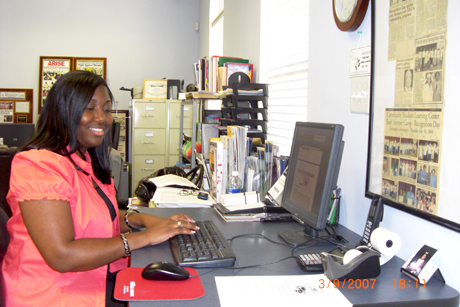The Obama Administration and congressional goal for putting $7.2 billion in the stimulus bill for broadband last year was to expand high-speed Internet “connections and information-age jobs” to areas of the country where there is a dire need.
For many rural Americans, that goal cannot come fast enough. In 2010, most people view broadband as a necessity. “In this technology age, broadband access is just as essential as running water,” said Corey Horton, legislative assistant in U.S. Congressman Bennie Thompson’s Washington, D.C. office. Horton grew up in rural Hinds County, Miss. “The area where my mother lives still does not have broadband access,” he added.
According to recent Commerce Department figures, nearly 40 percent of Americans do not have high-speed Internet access at home. In this part of The Mississippi Link multi-part series, several of these Americans share their plight due to a lack of broadband access:
My frustration
As a young professional living in a rural area, it is very stressful when the only thing that is offered Internet wise is dial-up. Do not get me wrong, I am thankful that I have some kind of Internet access. However, it is disheartening when you are accustomed to logging in on the Internet in literally seconds all day while at work and then when you have a project that you are trying to finish at home, it takes about three minutes for dial up to connect and to view the webpage. We are in an information age that changes daily. A lack of access is not fair to rural residents. We, just as other citizens, have the right to complete, quick, and full access to the Internet. It also makes a difference in emergency situations. — Porche Frizell of Rural Durant
Drives to town for high speed
I have been trying to get this information to you [The Mississippi Link), but it has been a slow process. Some of my difficulties in not having broadband service is that it is so hard to get anything done using dial-up, which is super slow. It takes a while just to access my email. I waste and spend more time doing simple tasks that would only take a second using high speed Internet. To download takes hours. I recently relocated from Atlanta to be with family; therefore, I’m seeking employment. I have to drive to the library in town in order to complete online job applications. – Cherisee Marshall, Lexington
Children’s studies affected
My kids usually use the Internet for their school work, but it takes dial-up so long, and they get frustrated. My daughter is in college and when she comes home on weekends, it is hard for her to study. Some of the kids drive seven miles to Houston, Miss. to the McDonald’s or Subway with their laptops to access the wireless Internet. A few of the people out here got that satellite Internet system, but when I found out it would cost us $80 per month plus a costly connection fee, I didn’t bother. – Angela Gillespie, Chickasaw County
Making a living without broadband
As a freelance writer, it’s very difficult to research news stories or feature articles because of a dial-up Internet connection. Pages are extremely slow in loading and any video images or video links are not accessible at all. If I want to email pictures to my editor, I have to send them in batches because it can take up to three to four hours to download four or five pictures. If I have a pictorial series, I have to put them on CD and take them to the local library, which in my area, opens after 1 p.m., and is only open on certain days. Dropped Internet connection is also a constant problem with dial-up.
Because of dial-up, any virus spyware scans or updates, freeze my computer and I can’t work on anything else until those downloads are done, and they can take five to six hours to update, or longer. I miss a lot of calls from key contacts because they have called while I was on the Internet and my line was busy.
I wanted to take some online college courses, but that was impossible because the courses all require high speed or DSL.
The only other option for people who use dial-up is expensive satellite options that lock you in for two years. When this is what you do everyday, you really don’t have a choice. You either sacrifice and pay for the service or you continue to waste precious hours of your time trying to utilize the Internet for work.- M.J. Land, North Mississippi
I’d rather do without Internet
Everyday on my job, I have access to high speed Internet, but in the county where I live, I do not. I used to have a satellite system that provided me access, but the company sold out to another company which charges a $500 installation fee plus about $70-$80 per month. I’d rather do without Internet than to have dial-up. I’m an information technology specialist and with affordable, efficient broadband, I could ‘remote-in’ to deal with some technical problems at my office from home. – Antwan Clark, Holmes County
Last month, the Federal Communications Commission (FCC) released its 376-page broadband plan, which included extending its access to the entire country. To view or download the plan log on to http://www.broadband.gov/download-plan/


Be the first to comment